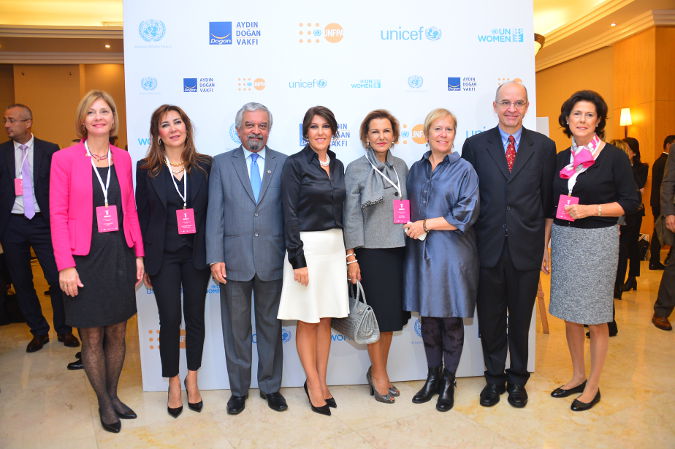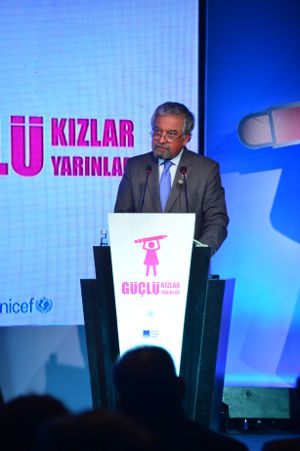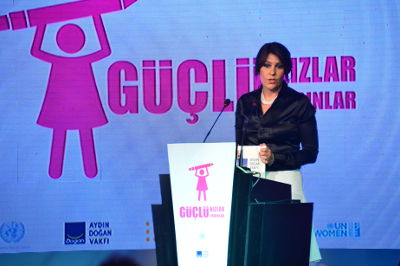Empowering girls today for a safer, healthier, more prosperous Turkey
Educating girls is the most consistent driver of development, and investing in young girls can accelerate Turkey’s fight against poverty, inequity and gender discrimination, UN conference attendees told.Date:

8 Oct 2015, Istanbul (Turkey) – Civil society and the UN in Turkey have come together to celebrate and promote the International Day of the Girl Child, 11 October, as a platform to mobilize action and resources on girls’ empowerment throughout the year with initiatives that bring girls’ empowerment to the agenda of Turkey’s decision makers, civil society and communities.
Organised by UN Women, UNFPA, UNICEF and the Aydın Doğan Foundation in consultation with the UN Gender Thematic Working Group (UN GTG), the conference Empowered Girls, Empowered Future: Ensuring Equal Opportunities in Education and Improving Life Skills sought to address the challenges girls face in Turkey and to promote girls’ empowerment and the fulfilment of their human rights.

There is overwhelming evidence that girls’ education is the most consistent driver of development goals and incomplete education means unfulfilled potential, attendees were told at the conference.
“There has been insufficient investment in addressing the challenges girls face when they enter the second decade of their lives. This includes obtaining quality secondary and higher education, avoiding child marriage, receiving information and services related to puberty and reproductive health, and protecting themselves against gender-based violence,” said Mr. Kamal Malhotra, UN Resident Coordinator and UNDP Resident Representative Turkey.
“According to the UN, globally 66 million girls cannot go to school. 116 million girls between the ages of 15 and 24 cannot finish primary school. This data points to the challenges we face for a brighter and more empowered future,” said Ms. Hanzade Doğan Boyner, the President of Aydın Doğan Foundation.
“49 per cent of women aged 20-24 are not in school or at work”

While Turkey has made considerable progress in education and almost achieved gender parity in education of children, socioeconomic and gender discrepancies persist in enrolment and attendance, and worsen into adulthood. Turkey ranks as low as 118th out of 148 countries in the gender development index and 125th out of 142 in the global gender gap index.
Although more girls are in school today than ever before, 28.2 per cent of women aged 15-19 are neither in school or at work, compared to 16.5 per cent for men. According to the OECD, 49 per cent of women aged 20-24 were neither in school, at work or in training in 2013.
“Girls are a powerhouse of talent, creativity and potential. Empowering girls today makes for a safer, healthier, more prosperous and sustainable tomorrow," said Ms. Ingibjorg Solrun Gisladottir, UN Women Regional Director for Europe and Central Asia, and Representative to Turkey.
“Adolescent girls have the power and potential to transform families, communities, nations and the world. Moreover and maybe most importantly, it is their right to have a more equitable and prosperous future,” said Ms. Lieke Van de Wiel, Deputy Representative of UNICEF to Turkey.
“Protecting girls’ rights and ensuring their access to quality education, employment, and reproductive health services are necessary to invest in their future,” said Mr. Karl Kulessa, UNFPA Representative to Turkey, and Country Director for Armenia, Azerbaijan and Georgia.
The day-long conference featured personal stories by Turkish women and panel presentations on equality and discrepancies in education, the rights of marginalised groups and the role of the NGOs in girls’ empowerment.
It brought together children, high level UN representatives and leading Turkish corporate, media, academic, entertainment and civil society figures and activists.
Key activities to mobilise girls’ empowerment and accelerate progress in girls’ education include:
- Reforms that address gender inequality in secondary schools, keep girls in schools and guarantee that they continue into higher education;
- Improving girls’ education;
- Increasing access for women and girls to services and opportunities;
- Raising women and girls’ participation in all facets of life;
- Changing social attitudes and behaviours that restrict girls and obstruct their full engagement in society;
- Developing children and young people so they claim equal rights and stand up for girls’ empowerment, protection and autonomy.